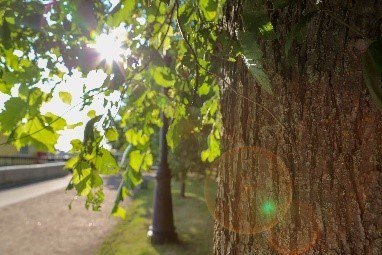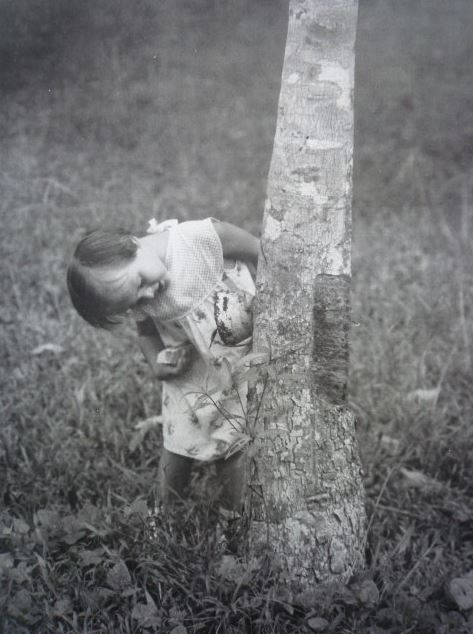Getting Into a Scrape
 |
| Photo credit: Yuri Fadeev |
I’m six or seven, climbing trees in my garden with my best friend. We’re spoilt
for choice, with apple trees, plum, cooking apple, and pear. The tied cottage
that comes with my father’s farming job is nothing short of idyllic and belies
the material poverty we live in. We are not nature poor, but I’m often reminded
that money doesn’t grow on trees.
It’s a hot day; we both
wear shorts and t-shirts. The difficulty of rating
each tree is varied and each of us has differing climbing capabilities. I am
the youngest of three, and when I’m with my elder siblings I
can only lay claim to climb the cooking apple tree.
Why? According to them, they are more adept than me. Plus, with its low, wide branches,
in some places it’s even easier to climb than a ladder. I’m not allowed to
attempt their trees. The pear trees require much more skill, with the first
branches at head height. This requires grasping a branch with both hands,
followed by some fancy leg swinging and walking feet up the trunk, then hooking
legs around the branch and then more upper body strength than you’ve got to pull yourself up. Plus, the bark is extra
rough and scratchy, so you must be careful not to pull your body in too close. The pear trees are
covered in nobbles that are uncomfortable because they’re pointy and scrapy.
And anyway, who even likes pears? Apples have always tasted better than pears
and no, I don’t get stomach ache from eating cooking apples raw, and besides the
bantams like to sit in the low branches with me. We’re a kind of team. My friend and I decided
to tackle the pear tree nearest the wire fence, after I discovered I could use
the diamonds in the wire to squeeze my toes in for extra purchase and hoist myself up to the
lowest branch with less strength and effort. We made it and sat side by side,
clinging onto the trunk and surrounding branches for support, legs dangling.
Quite proud. Until we remembered we had to get down. There is a branch you
must swing on and then you drop down to the ground. The taller you are, the less distance to
drop. It was agreed I’d demonstrate because I’d seen the expert actions of my
elder siblings, in comparison with my friend, who’d only heard second-hand stories from me. The branch was short as it was rotten
and snapped in half. The other half was somehow still solid and jutted out like
a large spiky thorn. Our hands would acquire some damage due to the rough bark,
so we prepped ourselves for the pain. Spit would help, we agreed. From where we sat, we had
to dive forward, both arms outstretched as if leaping for the top asymmetric
bar, like in the Olympics on the telly. We’d have to take our full weight,
swing a bit, then hang and drop. As I suspected, I felt like a truly
accomplished gymnast as my feet hit the ground. I’d done the whole thing in a continuous flowing
movement. My friend was heavier and less nimble and as she lurched forward, she
went too rigid. Hands gripped the broken branch but instead of swinging, her
torso made full contact with the trunk, her T-shirt riding up, and a ripping
sound as skin scraped bark. She hung there, mouth in a wide O, not daring to
move. I urged her: let go, you’re nearly there, not far to drop. Releasing her
grip, I heard the sound of a vacuum as she sucked in enough air for both of us. We congratulated
ourselves on a job well done, marvelling and laughing at how we’d tell my
siblings. It was then that I mentioned it. How’s your side now? The graze? What
graze? You were very brave. I
thought, ooh, that’ll hurt. I don’t know what you
mean? And then I pointed at it.
Look, here. And on her side, on her
right ribcage, was a
graze about three inches long, discoloured green-brown from the pear tree bark.
It wasn’t bleeding, really; it left no blood on her shirt, which somehow wasn’t
ripped. And that’s when the
wailing started. Long, and low, and loud, a bit like a cow. It attracted the
attention of the adults who’d just emerged from the back door. The nearer they
came, the higher pitched the noise became, until they were upon us, all
questions, and worry, and anger, and blame. My agility was suddenly a bad thing. How could I possibly expect others to be able to do the things I could do? Why did you decide to do it? Why did you encourage her? You’ve got your own tree. No one listened when I pointed out she’d not even noticed the injury until I’d shown her. It made no difference. Whatever I said or did just caused more upset. At that moment, I was held in this peculiar space of having all the power and simultaneously having absolutely none. Simone Chalkley |



Love the sentence: "We are not nature poor, but I’m often reminded that money doesn’t grow on trees."
ReplyDelete